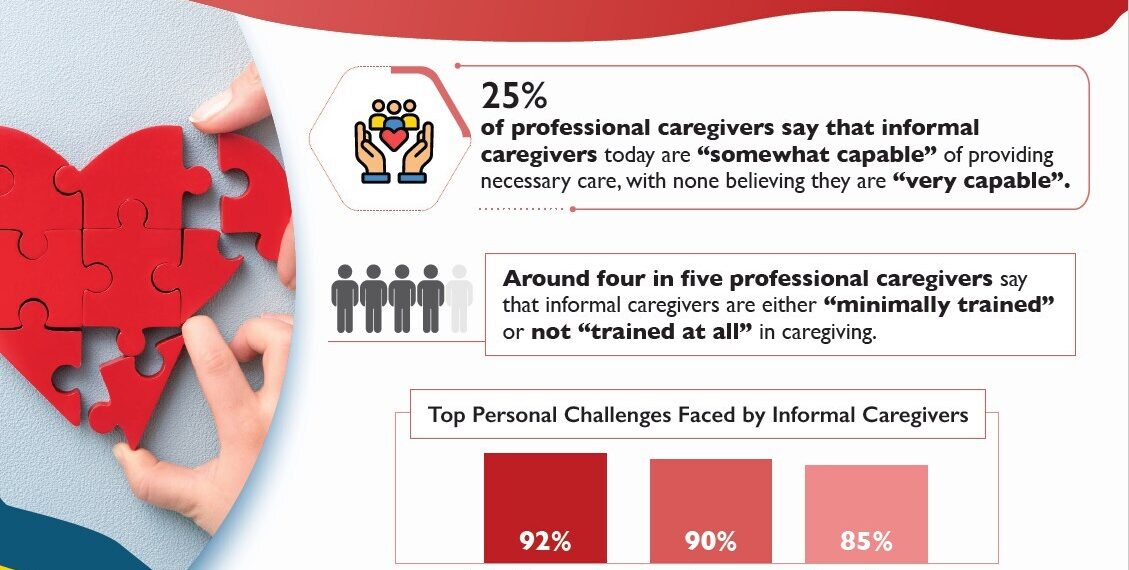 |
- Despite nearly all professional caregivers agreeing that informal caregivers can help bridge the demand of caregiving in Singapore to a certain extent (30% large, 45% moderate, 23% small extent), only a quarter of professionals (25%) say that informal caregivers today are “somewhat capable” of providing necessary care, with none believing they are “very capable”.
- Around four in five (79%) professional caregivers say that informal caregivers are either “minimally trained” or not “trained at all” in caregiving; with all professionals agreeing (47% strongly agree, 53% agree) that informal caregivers should receive formal training, especially in skills such as basic emergency response (92%), proper lifting and transfer techniques (90%), recognising condition-specific warning signs and symptoms (88%).
- Nearly half of professional caregivers (47%) perceive that informal caregivers feel undervalued by society, employers, or even their own families, with a lack of respite care (92%), sleep deprivation (90%), and financial strain (85%) among the top personal challenges faced by informal caregivers.
Singapore, July 25, 2025 /PRNewswire/ — Amidst the growing pressures of a super-aged society, Singapore’s healthcare sector is experiencing a surge in caregiving demand. While all professional caregivers agree that informal caregivers, such as family members, foreign domestic workers, and volunteers, can help alleviate the demand of caregiving to a certain extent (30% large, 45% moderate, 23% small extent), there are concerns about their capability to provide effective care. Notably, a quarter of respondents (25%) consider informal caregivers only “somewhat capable”, with none believing that they are “very capable”.
This is further compounded by the widespread belief among professional caregivers that informal caregivers are undertrained (77% minimally trained, 2% not trained at all). Consequently, all of them agree (47% strongly agree, 53% agree) that informal caregivers should receive formal training. Essential skills identified by the professionals include basic emergency response (92%), proper lifting and transfer techniques (90%), recognising condition-specific warning signs and symptoms (88%), while important soft skills include decision-making (92%), adaptability (84%), and communication (83%).
These are some of the key findings from NTUC LearningHub’s Industry Insights Report 2025 on Caregiving, which investigates how professional caregivers, such as those working in the healthcare and social service sectors, perceive informal caregivers who provide support to individuals in need of care at home. Based on a survey of 200 professional caregivers, the report also explores the potential gaps in the caregiving landscape and the implications of evolving healthcare needs on informal caregivers.
Additionally, the majority of professional caregivers (77%) also reveal that informal caregivers have little to no awareness of available resources and support services. The most common obstacles to providing effective care include a lack of medical and nursing knowledge (90%), time management (85%), and lack of access to proper equipment or assistive devices (81%).
All professional caregivers agree (59% strongly agree, 41% agree) that there is an increasing demand for trained caregivers in Singapore, primarily driven by the ageing population and rising prevalence of chronic illnesses.
In response to this growing need, all professional caregivers agree (30% large extent, 49% moderate extent, 22% small extent) that the adoption of assistive technologies has also helped to reduce the burden on informal caregivers, with the most helpful tools identified being mobility aids (97%), emergency response devices (92%) and smart home monitoring systems (82%). However, key barriers to adoption include a lack of training or guidance in effectively using assistive technology (91%), high cost of assistive technologies (91%), and technical complexity of using/setting up assistive tools (89%).
At the same time, nearly half of professional caregivers (47%) believe that informal caregivers feel undervalued by society, employers, or even their families as they face personal challenges such as a lack of respite care (92%), sleep deprivation (90%) and financial strain (85%).
Commenting on the report’s findings, Mr Tay Ee Learn, Assistant Chief Executive Officer and Chief Sector Skills Officer, NTUC LearningHub, says, “Demand for caregiving support is rising as Singapore’s ageing population and the growing prevalence of chronic illnesses lead to longer-term and more complex care needs. Beyond professional caregivers, informal caregivers are quietly but surely cementing their role as key contributors in the care economy, providing invaluable day-to-day care. It is therefore important that they are given access to formal training and relevant resources as they often take on complex caregiving responsibilities without prior experience or professional guidance. With proper training and support, informal caregivers can be empowered to deliver safer, more effective and quality care for their loved ones without compromising their personal well-being. Ultimately, formal training also leads to certifications, providing opportunities for informal caregivers to become professionals in the healthcare sector.”
To download the Industry Insights Report 2025 on Caregiving, please visit www.ntuclearninghub.com/media/research-reports/2025/Caregiving. To find out more about the courses, training, and grants, please contact NTUC LearningHub at www.ntuclearninghub.com.
About NTUC LearningHub
NTUC LearningHub is the leading Continuing Education and Training provider in Singapore which aims to transform the lifelong employability of working people. Since our corporatisation in 2004, we have been working with employers and individual learners to provide learning solutions in areas such as Infocomm Technology, Generative AI & Cloud, Healthcare, Retail & Food Services, Employability & Literacy, Business Excellence, Workplace Safety & Health, Security, Human Resources & Coaching and Foreign Workers Training.
To date, NTUC LearningHub has helped over 34,000 organisations and achieved more than 3.2 million training places across more than 1,000 courses with a pool of about 1,000 certified trainers. As a Total Learning Solutions provider to organisations, we also forge partnerships to offer a wide range of relevant end-to-end training. Besides in-person training, we also offer instructor-led virtual live classes (VLCs) and asynchronous online learning. The NTUC LearningHub Learning eXperience Platform (LXP) — a one-stop online learning platform — offers timely, bite-sized and quality content for learners to upskill anytime and anywhere. Beyond learning, LXP also serves as a platform for jobs and skills development for both workers and companies.
For more information, visit www.ntuclearninghub.com.






